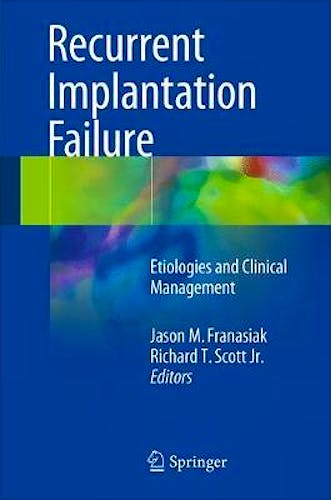

No hay productos en el carrito



Recurrent Implantation Failure. Etiologies and Clinical Management
Franasiak, J. — Scott Jr., R.
1ª Edición Mayo 2018
Inglés
Tapa dura
215 pags
520 gr
15 x 23 x 2 cm
ISBN 9783319719665
Editorial SPRINGER
LIBRO IMPRESO
-5%
103,99 €98,79 €IVA incluido
99,99 €94,99 €IVA no incluido
Recíbelo en un plazo de
2 - 3 semanas
LIBRO ELECTRÓNICO
-5%
93,59 €88,91 €IVA incluido
89,99 €85,49 €IVA no incluido
Acceso On Line
Inmediato
Signaling Between Embryo and Endometrium: Normal Implantation.- Embryo and Endometrial Synchrony in Implantation Failure.- Spermatogenesis: Fertile Ground for Contributing to Recurrent Implantation Failure?- Embryonic Factors Associated with Recurrent Implantation Failure.- The Genetics of Pregnancy Failure.- Immune Factors in Recurrent Implantation Failure.- Stress and Recurrent Implantation Failure.- Hematologic Disease in Recurrent Implantation Failure.- Endocrine Causes of Recurrent Implantation Failure.- Anatomic Abnormalities and Recurrent Implantation Failure.- Microbiome in Embryonic Implantation and Recurrent Implantation Failure.- Psychosocial Implications of Recurrent Implantation Failure.
This unique text discusses the wide range of causes and pathophysiologic conditions contributing to recurrent implantation failure (RIF) and the current treatment approaches to best approach this challenging patient population. Beginning with a presentation of the mechanism of normal implantation, the physiologic synchrony between embryo and endometrium, and the roles of both gametes and embryos in RIF, the book then examines the various genetic, immune and environmental factors involved. Abnormalities of the hematologic and endocrine system, as well as those of the anatomy and microbiome, are described in detail. Last but no less important, the psychological stress and treatment of patients experiencing RIF is discussed.
Assisted reproductive technology (ART) success has increased substantially over the past three decades. However, despite these advances, recurrent implantation failure is still a common issue confronting patients and clinicians, and RIF represents one of the greatest challenges in ART and remains a source of frustration and disappointment for patients, clinicians, and researchers involved in the process. Providing an in-depth investigation into the pathophysiology and biological mechanisms of RIF and its clinical management, this will be an excellent resource for reproductive endocrinologists and infertility specialists.
Jason M. Franasiak, MD, TS (ABB), Assistant Professor, Sidney Kimmel Medical School, Thomas Jefferson University, Reproductive Medicine Associates of New Jersey, Basking Ridge, NJ, USA
Richard T. Scott, MD, HCLD/ALD (ABB), Professor, Sidney Kimmel Medical School, Thomas Jefferson University, Reproductive Medicine Associates of New Jersey, Basking Ridge, NJ, USA
© 2025 Axón Librería S.L.
2.149.0